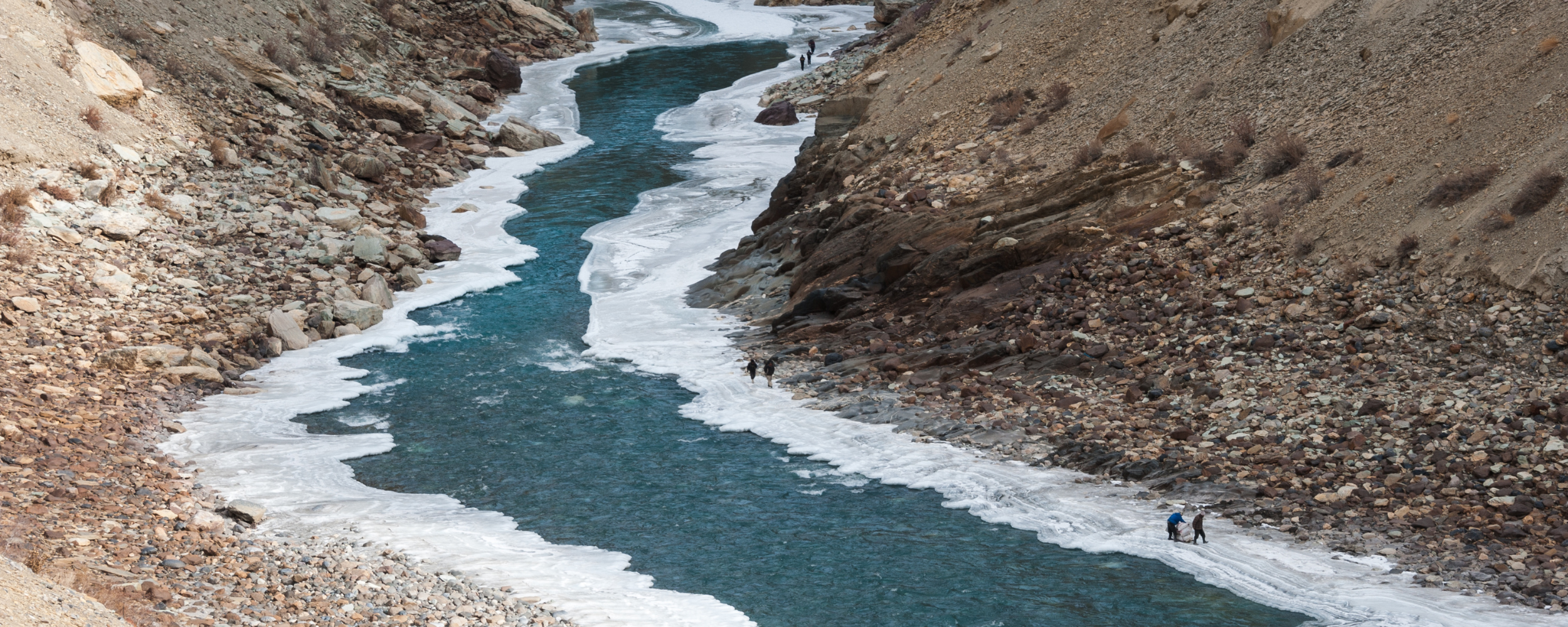Itinerary
Day 1 :
Fly to Leh : Pickup from Airport and Drop to The Guest house
Overnight stay at the hotel/guest house.
Keep your woollen cap and gloves handy.
Flying over miles and miles of heavily snowed mountains will tell you just why it's impossible to reach Ladakh by road in the winters. The moment you land at the Leh airport, one of the highest airports in the world, you will feel the fresh and crisp air, and a drastic drop in the temperature. The town has just begun shedding off the thick winter slumber and is slowly coming to life. Taking a stroll through the Leh market, you will find that very few shops and eateries in the town are open for business; but if required, some last minute-shopping for the trek can be done here. The chill in the air will serve only as a preview of the temperatures during this winter trek. The night is spent in a copy guest house.
Day 2 :
Drive to Tilad Do via Chilling (11,400 to 10,390 ft)
Climb to Shanti Stupa and Witness the Sunrise
Trek to Tilat Sumdo ( 1-2 Hours approx.)
Overnight stay at camps
You can start the morning by witnessing the sunrise from the Shanti Stupa , from where you can get a panoramic view of the entire town of Leh and its surroundings. You can also see the peak of Stok Kangri almost beckoning you to climb it.
But today's agenda includes a very picturesque and thrilling long-drive to Chilling. The roller-coaster ride takes you along the Indus to the village of Nimu, where the Zanskar converges into Indus. After stopping at this confluence point to take in the view, the drive continues and the road begins descending right into the river valley. There are quite a few heart-stopping moments as the vehicle negotiates the steep hairpin bends over snow covered road. The road goes past Chilling to Tilad Do. Among these mammoth mountains, the feeling of insignificance of one's being does not escape anyone.
To reach the camp-site, you have to cross the frozen Zanskar river and this is when you take your first steps on the Chadar. It takes a while to get a hang of walking on the ice sheet. As the evening comes, the team pitches tents on the banks of the Zanskar, and hands out thick warm sleeping bags. To get some exercise and keep warm, you can climb up the nearby mountains and get a good look at the frozen river. As the sun sets, it drags the temperature down with it, and the sleeping bags in the tents look quite inviting.
Day 3 :
Tilad Do to Shingra Koma (10,390 to 10,550 ft. Trek 10 kms)
Reach Gyalpo via Shingra Koma , Overnight stay in camps at Gyalpo
The biggest challenge of this day, and all the remaining days, is to get out of the warm toasty sleeping bags and go out into the giant freezer outside, but the steaming cups of tea being served provide ample motivation.
Today is a long walking session, about 10 km, on the Chadar. The trek leaders will give a briefing about the day, and give tips on how to walk on the Chadar. Depending on the weather, the Chadar can assume various forms. It can be a cold and hard surface of slippery ice, or it can have a dusting of snow over it, providing a good grip. The ice can be thick or thin, and its best to keep closely following the guide. The locals, it appears, have a sixth sense as to where exactly to step on the Chadar. At places, it might be necessary to wade through ankle deep water, or climb on the cliffs at the side of the river. Eventually you get used to walking on the Chadar, which looks like a cross between gliding and skating. Mid way to Gyalpo, the porter-cum-cooks prepare hot bowlfuls of soupy noodles for lunch. It is important to keep up a decent level of fluid intake. Nothing makes you adapt to the conditions faster than nicely circulating blood in your system.
After passing Shingra koma, you reach the camp-site for the day at Gyalpo. The Gyalpo campsite is at a bend in the river, surrounded by high peaks and walls of rock-faces which almost look man-made. All that is left to do is to soak in the views, have an early dinner and call it a day.
Day 4 :
Shingra Koma to Tibb Cave (10,550 to 10,760 ft. Trek through Zanskar (15 km approx)
Overnight stay in tents
This day follows the same early morning routine: bed tea at 7, breakfast at 8, and quick-march at 8:30. Have a good breakfast, as today is the longest walk of the day - almost 15 km. But that is nothing to worry about, all the walking keeps you incredibly warm.
Today's walk through the deep ravines of the Zanskar is stunning. The sublime walls of the mountains on either sides of the river keep the sunlight away from the Chadar for most part of the day. There are numerous caves in these mountains, big and small. Today is the day when you can see frozen waterfalls, some higher than the others. As the fable goes, centuries ago the local villagers faced a dearth of water and went to Tibet to plead for water. They were given a box which they were to open once they reached the village, and not any time sooner. But curiosity got the better out of them, and when they opened the box, two fishes jumped out of it, creating two huge waterfalls. One of those waterfalls, miraculously, is not iced-up even in such freezing cold. The rocks below this waterfall are covered with moss, and this is the only greenery you'll see on this trek.
At Tibb, there is a big cave. This cave is the dwelling of all the porters, and they welcome you warm-heartedly in here. The highlight of the day is to share a cup of butter-tea with them!
Day 5 :
Tibb cave to Naerak camp (10,760 to 11,150 ft. Trek 12.5 kms
Overnight stay at camps in Nyerak Village
Attraction Frozen waterfall
Today is the most spectacular of all days on this trek. Walking on the river you cross deep gorges and reach a point where Juniper trees are covered with prayer flags. The porters give you a twig of this tree tied with a piece of prayer flag as a badge of good-luck and good-health. A few steps away stands the mother-of-all frozen waterfalls - a huge instance of suspended animation several feet tall and equally wide. You can see dozens of colours in this enormous ice structure as sunlight plays off its surface. Right next to the waterfall is a bridge across the river which is a part of the summer-time road from Zanskar to Leh.
The Naerak village lies several feet above the river, a vigorous hour-long trek can take you to the village if you want to see the life of a Zanskari. The camp is set up close to the river.
Day 6 :
Naerak to Tibb Cave (11,150 to 10,760 ft Trek 12.5 kms)
Stay in tent
Today you start the return journey and go back to the Tibb cave. And if you thought that it was just a matter of retracing your steps back to Chilling, you can think again. The Zanskar River reacts to the slightest change of temperature, and constantly keeps repackaging itself. The Chadar would have assumed a completely new form, and will it will almost be impossible to say whether you have been here before.
On the way, you can meet a lot of locals wearing their traditional woollen Gonchas - some of them monks who are hiking from the Lingshed Monastery to Leh, some of them young students accompanied by their parents returning to their schools in Leh after the winter vacation. Watching the locals negotiate the Chadar is a fascinating sight. They are suitably adept to the climate and seem very much at home in the sub-zero temperature and the biting cold winds. Nothing wipes the smiles off their faces and dampens the warmth of their spirit.
Day 7 :
Tibb Cave to Shingra Koma (10,760 to 10,550 ft. Trek 15 kms) Stay in tent
Starting from Tibb, go up to Gyalpo today. The high walls of mountains rising from the sides of the river almost look like castle walls. You can see several trails of pug-marks all along the trek - footprints belonging to foxes, ibex or snow-leopards. You would be lucky to view a snow-leopard; but you can almost be sure that you are being watched by one all the time.
Day 8 :
Shingra Koma to Tilad Do and drive to Leh (10,550 to 10,390 and drive to 11400 ft. Trek 10 kms)
Drive 65 kms to Leh
Last day of Chadar Trek
Check-in into the guesthouse
Dinner , Overnight stay in the guesthouse
This is the last day of treading on the Chadar - the last chance to immerse in the pristine beauty of the frozen river. Once you reach Tilad Do, it is time to say good-bye to the Zanskar and the Zanskaries. The team and porters will take good care of you and make this trek one of the most memorable experiences for you. Tonight you get to sleep in a warm guest-house again.
Day 9 :
Leh Departure
After Breakfast Check out Guest , Continue with your return journey


